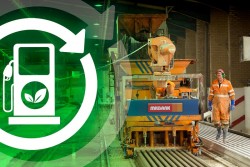Based in Colchester, Essex, leading precast concrete firm Milbank
Concrete Products are taking action and encouraging other leaders within the
industry to work towards a more sustainable future by adopting the use of
hydro-treated vegetable oil (HVO) - a more environmentally friendly biofuel
alternative to regular diesel.
It’s no secret that the manufacture of precast concrete is notoriously
detrimental to the environment and plays a key role in the production of
harmful CO2 emissions produced by the construction industry. After coal-powered
electricity, use of cement is the next biggest emitter of greenhouse gases,
accounting for approximately 5% of annual anthropogenic global CO2 production,
with one-tonne of CO2 produced for every tonne of cement.
Immediate action is required to improve sustainability, reduce
carbon emissions and work towards a greener future – and it’s not as difficult
as you might think. Milbank Concrete Products have already been proactive in
adapting their processes to work towards carbon neutrality with the
introduction of a wood pellet fuelled biomass boiler and electric vehicle
charging points, with the next part of their future sustainability strategy
focussed on the reduction of diesel use within their site operations.
With immediate effect they have announced that 100% of their
production machinery, including fork trucks, loading shovels, shunters,
dumpers, cherry pickers and prestressed concrete manufacturing machines, will
transition from the use of regular diesel to HVO – a hydro-treated vegetable
oil biofuel that boasts CO2 reductions of up to 90%.
Following extensive trials, it was noted that by adopting 100%
HVO, greenhouse gas emissions produced by their machinery reduced by up to 90%,
with a 35% reduction in particulate mass and a 30% reduction of CO2 company
wide. This was most noticeable by those working the machines who noted a clear
improvement in the exhaust fumes. A colossal 75,000 litres of diesel are used
every year by the firm at their Essex-based manufacturing facilities, all of
which to be substituted for the green biofuel alternative.
Chairman, Sean Milbank, said: “We
believe that as custodians of this type of business, we have a responsibility
and duty to invest in technologies and processes to reduce our impact on the
environment and hopefully encourage our customers, suppliers and competitors to
follow suit”.
HVO meets EN 15940 standards and the Fuel Quality Directive
2009/30/EC Annex II, so can be used as a direct, drop-in alternative to mineral
diesel. It can used without changes to infrastructure or capital expenditure,
removing cost barriers and enabling a practical step towards decarbonisation.
Synthesised from waste fats and vegetable oils, it is renewable, sustainable
and 100% biodegradable, mixing well with pre-existing diesel. It has been readily
approved by many of the large OEM engine manufacturers and boasts an impressive
storage life of up to 10-years.
This announcement is a major steppingstone in Milbank Concrete Products vision for carbon neutrality and they are encouraging others where possible to get on board and make the change. If you are interested in finding out more about HVO or would like to discuss logistics and the available supply-chain, you can contact Milbank Concrete Products directly on info@milbank.co.uk or by calling 01787 223931.









